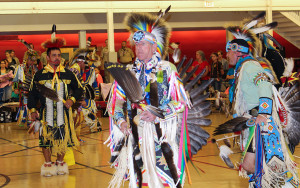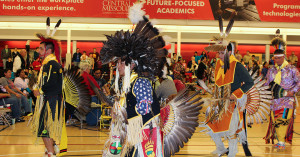
PHOTOS BY BRANDON BOWMAN / PHOTO EDITOR
Chris Robbins, center, of Kansas City, Missouri, and fellow dancers perform at the powwow on Saturday afternoon on the lower basketball courts of the rec center. Robbins said he’s been dancing at powwows since age 14 and participates in as many powwows as he can.
By ANDREA LOPEZ
Features Editor
(WARRENSBURG, Mo., digitalBURG) — Every weekend, there’s a powwow somewhere, but last weekend was the first time UCM hosted one.

Jake Lawhead,6, is dressed in fancy dance regalia at the powwow. Lawhead said he likes powwows because they let him get his own style out.
“If you want to learn and see us at our best, this is something that we celebrate all the time – all year round,” said Randy Falcon, a Native American dancer from Springfield, Missouri. “We start in March and we don’t end until now. Between Saskatchewan, Canada, and here, we go everywhere.”
UCM hosted its first Trading Moon Pow Wow Saturday afternoon in the Student Recreation and Wellness Center where Native American dancers from around the country came together to share their culture with the city of Warrensburg.
From men and women dressed in Native American regalia and performing traditional dances to selling fry bread and beadwork to sharing a traditional feast in Ellis Dining Center, the day was filled with celebrations of Native American culture.
Falcon, who began dancing at the age of 7, still has that burning passion to dance at 56 years old.
“I have my own dance group called Beyond the Circle,” Falcon said. “They call an arena a circle, and when we do outside shows, we take it beyond that. We tell people who we are and how our people do things.”
November is traditionally a time to trade with neighboring towns and the time of a friendship festival called Ado Huna, which means “New Friends Made,” according to the powwow’s program. The month is recognized to share with people in need so they can get through the upcoming winter season.
“Powwow – it means like a gathering to get together – that’s what we do here,” Falcon said. “Celebrate our culture and our heritage. We get to see old friends and old relatives.”
Justin Davis, senior business management major, said he attended the event for his music of world culture class.
“We took a unit over Indian music and powwows, so I kind of already knew what was going to happen,” he said.
“The traditions feel strong. Everybody is dressed, as they should, back in the day. And they still sing the same, it’s just different people.”
Riamanda Branson, a freshman psychology major, attended the powwow in spirit of her slight Native American roots.
“I think music speaks to everybody, and I think just learning the different cultural music can speak to just about everybody, even if you’re not technically a Native American at all.”

For Jesse Lee, second from left, and John Lee, second from right, dancing at powwows is a family time. Jesse, John’s father, said he has been dancing for his whole life and would love to have more powwows at UCM. Both Lee men work on campus at UCM.
Catherine Burris, director of the UCM Center for Religious Studies, co-coordinated the program with Rose Gubele, associate professor of English.
“(Gubele) brings expertise in Native American culture, that I simply don’t have,” Burris said. “She is herself – Native American – and she teaches some courses on Native American culture. So together, we had the basics.”
Burris said more than $21,000 in total grant funding from the Missouri Arts Council and the Missouri Humanities Council financed the Trading Moon Pow Wow.
“It specifically was used to get facilities, to pay for the traditional feast for the dancers and to pay the head staff for leading things for us,” Burris said. “For our consultants, to make sure we do everything in line with tradition.”
Burris said the university will have more time in future years to advertise hosting the Trading Moon Pow Wow and ask professors to work Native American traditions and culture into their syllabi.



Leave a Reply